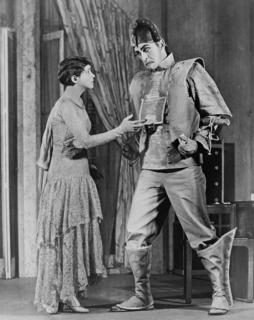
The Czech word ROBOT celebrates its 100th anniversary this year
10.02.2021 / 10:17 | Aktualizováno: 13.01.2022 / 11:02
On January 25, 2021, it´s been 100 years since the premiere performance of Karel Čapek's theatre play called R. U. R. took the place at the Czech National Theatre in Prague. The word ROBOT first appeared in the play, which soon became an integral part of our everyday life, as well as a global phenomenon and one of the symbols of the emerging technological civilization.
Karel Čapek started to write R.U.R. (the full name of the corporation that gave the play its name was Rossum's Universal Robots) in the early 1920s and supposed the world premiere would be at the National Theater in Prague by the end of the year. Therefore, the play was published in November 1920 by Aventinum publishing house in a graphic design and with a woodcut cover by Josef Čapek, Karels' brother. Unfortunately, the original plan was disrupted by amateur theater ensemble from the provincial town of Hradec Králové, who didn´t respect the postponement of the first night at the National Theater, and the world premiere of R.U.R. thus took place at the regional theater stage, performed by amateur actors, directed by the State Railways inspector on January 2, 1921. In spiote of the fact, that it was staged at the Czech National Theatre on January 25, 1921, more than three weeks later, it lasted in repertoire for six following years and the tickets were even sold on the black market.
Čapek’s "collective drama in introductory comedy and three acts", as the subtitle of R.U.R. reads, became immediately a hit. Čapek managed to grasp an important topic of his time - the potentially destructive influence of technological civilization on society. At the same time, he created an impressive warning metaphor of modernity dominated by more than a self-confident and ruthlessly practical mind and predatory businessman Rossum. Contemporary criticism of the play was not always favorable, though praise significantly prevailed. In Czechoslovakia, in particular, the leftist cultural avant-garde rebuked Čapek for seizing a catchy topic, while not bringing anything new. However, Čapek's play appealed to audiences all over the world.
As early as 1921, the drama premiered in Aachen (Germany), a year later in Warsaw, Belgrade, New York, in 1923 in London, Vienna, Berlin, Zurich, and the following year in Paris, Tokyo, Budapest, and Krakow. The translations into a number of European languages followed in the same decade. The drama was also appreciated by H. G. Wells, H. G. Wells, the famous author of the War of the Worlds and one of the world's most influential public intellectuals of his time, who later promoted Čapek’s Nobel Prize nomination. In 1938, R.U.R. became the first television production of science fiction when the BBC as one of its first dramatic acts presented it.
The Czech native robot thus gradually occupied all the world's cultural, but also scientific and general public space. Unlike a man who can only become a global celebrity, he has become a global phenomenon, one of the symbols of an increasingly powerful technological civilization (technosphere).
Source: The text is based on an article by Jaroslav Veis "Robot, the most famous Czech celebrates its 100 years!"








Follow us on